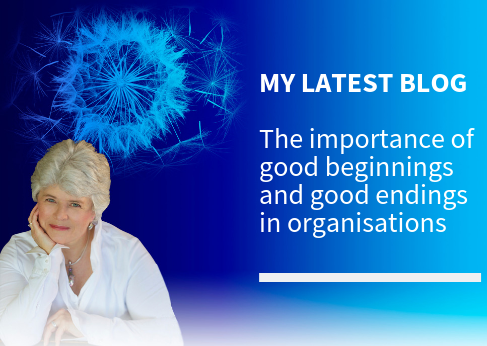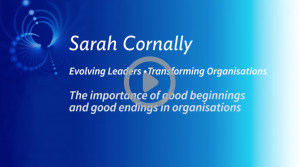
The importance of good beginnings and good endings
When you join an organisation, it’s really important that you have what we call a good beginning. This makes you feel that you’re welcome, and that you actually have a place. In practical and obvious ways the organisation makes space for you to come and join it. The reason this is important is so that you can get to work quickly. If you don’t have a good joining, you don’t know where you fit, and how you belong. You’ve got to spend a lot of time and energy working all of that out. However, if the individuals in the system make you feel welcome and make space for you, this means that you have a good sense of belonging right from the start. We might even notice this in family dynamics or relationships, where, if we don’t have a good beginning, we can have difficulties for quite some time in the relationship until we work things out or not.
The other part of the equation is a good ending. A good ending allows you to feel free to go, when you leave. You feel complete, that you’ve done everything that you had to do in the organisation, that it’s respected and honoured, and you feel appreciated. That leaves you free to go to the next thing without any kind of lingering ties. The other thing that’s really important about that is that the role itself is left clean for the next person. When you step into a role where there has not been a good beginning and good ending, the role is tainted, often with dysfunctional elements that you will need to manage. You won’t necessarily be conscious of them, but there will be dynamics at play that you don’t understand or that don’t make sense. Invariably, if there’s been a bad ending, only part of the story is told, not the whole story. That’s normal human behaviour – when something unpleasant happens people don’t want to talk about it. However, we need to get good at talking about difficult or unpleasant things in a way that dignifies them. It doesn’t need to legitimise them, but it dignifies them. Systemically, sometimes people can come in, be disruptive, and disappear. It common to be judgmental about the disruption, but the disruption may have been really helpful to the system in an unexpected way. So they actually provided a service, albeit in a strange way.
Another consideration is the timing of someone leaving. What can happen with somebody who comes into an organisation and makes a great contribution, is that you really, really love them, and you don’t want them to go. They’ve been so wonderful, so sometimes we then try and find artificial roles for them to fulfil. It’s like we’re hanging onto them past their natural, organic point of closure with their contribution to the organisation. This creates disturbances in the system – for the individual and other people – because you’ve now got someone in the system that doesn’t actually belong there anymore.
The other really big challenge is for you to know when it’s time for you to go. There’s a beautiful example playing out right now with Angela Merkel, the Chancellor of Germany. She’s had a very strong run in her role over 18 years, but of recent times, there have started to be disturbances and disruptions, and she’s been listening to that. I don’t know her personally, but just by watching what we’re seeing in the media, she appears to be paying attention to all of the signals. She’s found a dignified way to leave, to make a good transition, and to position it well for her replacement. So she’s going to leave, it would appear, in a very dignified, respectful manner, with her legacy honoured and appreciated, and the person coming into the role positioned in a way that is an uplift for them. If we consider other political situations, where we see how much turbulence and difficulties leaders have had to deal with, following their predecessor’s bad leaving, you can actually even notice a compounding pattern of difficulties. This is systemic dynamics at play.
Good beginnings, good endings, knowing when to leave and how to leave in a fashion that is dignified are all critical elements to enable ongoing healthy system dynamics in organisations.
Written by Sarah Cornally
Strategic Leadership Advisor
Cornally Enterprises Pty Ltd
PO Box 4413, Castlecrag NSW 2068 Australia
Fax +61 2 9475 0254









